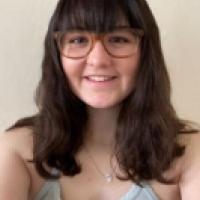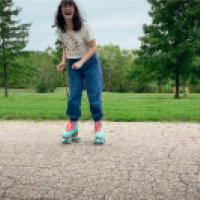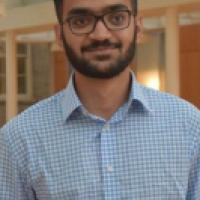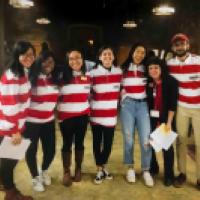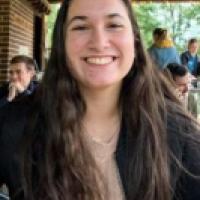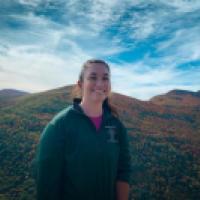Ruby French
Why did you choose Cornell?
I chose Cornell because of its excellence in education and the opportunities it provides. Cornell allows students to explore all of their academic interests and to get involved in a myriad of extracurricular activities. Cornell's principle of "any person...any study" inspired me; Cornell truly aspires to this motto of accepting students from all backgrounds and providing a wide breadth of courses and majors. Additionally, I chose Cornell because of its commitment to diversity and sustainability.
My main extracurricular activity is Students for Students (formerly Cornell Mentors for Incarcerated Youth). This is a fantastic organization in which students at Cornell tutor and mentor students at a local juvenile detention center in Ithaca. I joined this group as a sophomore, inspired by my good friend Grace Mehler who was the co-president of SFS at the time, and I am currently the co-president of the group. This organization is extremely important to me because it has taught me how to connect with people who are different from myself and it has given me the opportunity to work with some amazing students. Students for Students provides tutoring in academic courses and college/work preparation, as well as mentorship, but it also does so much more. SFS allows Cornell students to gain a new perspective on our local community and to get involved with the criminal justice system.
How have your beliefs or perspectives changed since you first arrived at Cornell? What have you discovered about yourself?
Although Ithaca feels small to most, to me it is like a big city compared to where I grew up. Being at Cornell has broadened my worldview immensely and introduced me to many new things. I have learned how to communicate with people from different backgrounds from myself and my perspective on the world has become much more globalized. My beliefs on personal responsibility have changed due to my time on campus and my academic career. I have a greater sense of urgency about the world; I strongly believe that everyone is responsible for actively working toward a better society when we live in the midst of institutional injustice. It is my duty as a citizen of the world to stand up to injustice, whether it be racial prejudice or discrimination, climate change or gender/sexual orientation inequality, etc.
Who or what influenced your Cornell education the most? How or why?
Professor Sabrina Karim, my project supervisor for my research team, my thesis advisor, and my mentor, has influenced my Cornell education more than anyone or anything else. She has truly shaped and guided my education and I am extremely grateful to have her as professional, academic and personal mentor. She is an outstanding teacher (I took her course Political Violence) and an amazing research supervisor. When I knocked on her office door as a nervous sophomore interested in her research project, I had no idea she would become one of the most important people that I have had the privilege to meet and work with at Cornell. I have worked as her research assistant for more than two years now and I have learned so much from her about research, data analysis, writing and managing a complex and long-standing research project. When she promoted me to the head research assistant, I was so excited; I had never been in charge of something so important. Additionally, Professor Karim encouraged me to write an honors thesis on U.S. foreign aid and its effects on civil conflict recurrence around the world. Writing a thesis has challenged me in ways I didn't expect and it has taught me about the value of thorough data collection and analysis.
If you were to offer advice to an incoming first year student, what would you say?
Arts & Sciences at Cornell offers you the ability to thoroughly explore your academic interests. Even if you have already decided on a major, push yourself to try new things and take courses you are interested in, even if they are outside your major or seem very difficult. Challenge yourself and question your own beliefs. Also, learn time management skills quickly! My best tip: treat your semester like a 9-5 job; go to campus (if the pandemic allows you to be in Ithaca) Monday through Friday and stay all day even if you don't have class! Enjoy Ithaca (if you can)! It is a beautiful place to live and Cornell is a gorgeous campus!
Hassaan Bin Sabir
What are the most valuable skills you gained from your Arts & Sciences education?
In exposing me to the interconnectedness of seemingly disparate academic disciplines, my education forced me to reexamine the clear lines of demarcation we tend to draw between different facets of the human experience — the public and private, the holy and profane, the individual and collective, and so on. It taught me that while these distinctions, and the ideological doctrines that grow out of them, can be comforting, treating them as dogma has the capacity to do more harm than good. Such beliefs push us to cling to certainty where there is none, lead us to replace humility with hubris, and perhaps most critically, eat away at our already depleted reserves of compassion and empathy.
What is your main extracurricular activity and why is it important to you?
My main extracurricular activity has been serving popcorn at the Campus Activities Resource Centre in Willard Straight Hall. On a pre-pandemic campus, the popcorn stand was my sanctuary. I began working at the Resource Centre (RC) my freshman year solely because I wanted a campus job. However, it soon became the place where I experienced joy in its truest form. My time behind the popcorn counter taught me all those things you simply cannot learn inside the classroom. It was through conversations with strangers — students, faculty, staff, even local residents — over bags of popcorn that I discovered what it truly meant to be empathetic, kind and compassionate. These interactions led me to recognize the minute ways in which we can positively impact the lived experiences of those we interact with daily. And, over time, they also allowed me to assume an identity that felt like my own. Most importantly, serving popcorn at the RC gave me the opportunity to interact with my co-workers and supervisor, Linda Siptrott, who are some of the most incredible individuals I have ever been around, and from whom I have learned so much.
What Cornell memory do you treasure the most?
My most treasured memories at Cornell will always be the moments that, on the surface, appear to be the most mundane parts of my day — finally leaving bed at noon after hearing the sound of my flatmate’s kettle, waking up to my other flatmate banging on our wall after my alarm goes off for the sixth time and, most of all, sitting on the couch at 210 Linden with my flatmates as we find newer, more creative, ways to procrastinate on our work.
I value these moments precisely because of how ordinary they are. Often, we like to think that our lives are sustained by our aspirations, those grand or not so grand ambitions which we are either constantly striving towards or seeking to discover. However, it is these snippets of joy — the banter or ‘bants’ as we call it at the apartment — that both make us more human and sustain us as we try to make sense of the everyday.
Four professors have had the most profound impact on my Cornell education — Peter Katzenstein, Richard Bensel and Tom Pepinsky in the government department, and Dawn Chutkow at the Law School. Professor Katzenstein taught me how to think. Professor Bensel reminded me to stay humble. Professor Chutkow got me into law school. And without Professor Pepinsky, I wouldn’t have a thesis. I will always be incredibly grateful to them.
Where do you dream to be in 10 years?
Hopefully, I’ll be losing elections in Pakistan by then. I would like to eventually win them though.
How has your Cornell education and experience prepared you to deal with the challenges and uncertainty of the coronavirus pandemic?
For me, the pandemic has brought the same sense of loss, confusion, anxiety and exhaustion that we have read and heard about over the past year. So in that sense, my education, thankfully, has not made me any less human. It has also given me hope. My classes have shown me that moments or periods of crisis also offer opportunities for renewal, provided we are willing to put in the time, care, and energy needed for this regeneration. So, while we may not quite know what a post-pandemic world might look like, we can find solace in the knowledge that we possess the ability to shape that reality.
Evin Rothschild
What are the most valuable skills you gained from your Arts & Sciences education?
As a double major in government and biological sciences, I believe that the most important skills I learned were being able to apply concepts I learned in one area to another and see connections that I didn’t realize previously existed. I’ve always been interested in both medicine and policy, and taking classes in the sciences, government, and a variety of other courses helped me realize how much overlap there is between those two fields. Learning how to think across disciplines will give me the skills to devise solutions to real-world problems in my career.
What is your main extracurricular activity and why is it important to you?
Part of why I loved my Cornell experience so much was all of the different extracurricular activities that I took part in. Since freshman year, I have been on the Cornell Women’s Club Lacrosse team and a health policy analyst for the Cornell Roosevelt Institute. Playing on the lacrosse team gave me a second family at Cornell and teammates that I knew I could always rely on. It was a fun way to stay involved with the sport I grew up playing while also meeting new, interesting people. The Cornell Roosevelt Institute gave me the opportunity to see what brainstorming, researching, and developing policy proposals and blog posts on health policy topics important to me was like. I delved into the intersection of medicine and policy, and was able to understand that creating health policies aimed at combating health disparities is something that I want to incorporate into my career.
What Cornell memory do you treasure the most?
Spending my second half of junior year and all of senior year in a pandemic has allowed me to appreciate the simple times with my friends appreciating the outdoors. One day that stands out in my mind is Nov. 8, 2020. It was a sunny, warm day in the beginning of November, something rare for Ithaca. I was hiking around Robert Treman Park with a couple of friends when we got the news that Biden won the election. When we got back to campus, you could just feel the positive energy in the air. All across campus and Collegetown, students were celebrating (masked and socially distanced, of course) with roommates and friends, and just enjoying the beautiful November weather. Days like those when the energy of the Cornell community is so apparent are the ones that I will treasure most.
If you were to offer advice to an incoming first year student, what would you say?
My best advice would be to find a healthy balance between academics, extracurriculars, and time for yourself! College isn’t only about what you learn in classes; you can learn so much from trying new activities, exploring Ithaca, and making connections with other students and faculty who have such interesting and unique backgrounds and perspectives. Enjoy the little things, whether it's a long walk around Beebe on a sunny day with a friend, listening to the daily chimes concerts, or getting free popcorn at WSH (fingers crossed this makes a return shortly), and remember that you will get through each and every prelim. You were accepted for a reason, and know that you are able to make it through and succeed at Cornell.
Where do you dream to be in 10 years?
In 10 years, I’m hopeful to be finishing up my residency program on my journey to become a physician. While I have an open mind on what speciality that I will pursue, I know that I want to incorporate combating health inequities in my career as a physician. The pandemic reinforced the importance of physicians helping to create government policy that directly pertains to them, and I am hopeful to be splitting time between seeing patients and contributing to research and policy making that will close the gap in health disparities.

